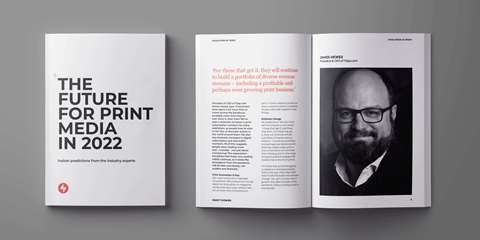At a glance:
- The internet has brought print to its highest level of attention-based media economy
- As conversation replaces content, print titles should capitalise on the rise of community
- How brands can build their credibility and trust in the age of data mining and AI
- Mass will be replaced by print that has a higher value at a smaller level
Read Part 1 of our series: spotlight on Jeff Jarvis, The Gutenberg Parenthesis explained. Print Power MD Ulbe Jelluma reviews this fascinating book.
Ulbe Jelluma: You started your career in print and then I guess by 2000 you made the move to the internet?
Jeff Jarvis: Yes I began my journalism career in 1972 when I worked for a local weekly newspaper before going on to work for the Chicago Tribune, TV Guide and People Magazine and Entertainment Weekly, The Guardian, the New York Daily News and the San Francisco Examiner. I was president and creative director of Advance Internet until 2005 and later took up the role of the Leonard Tow Professor of Journalism Innovation and director of the Tow-Knight Centre for Entrepreneurial Journalism at the Craig Newmark Graduate School of Journalism at the City University of New York, directing its new media program. I created the weblog BuzzMachine which tracks developments in new media, I co-host a podcast called This Week in Google, and I’ve written a series of digital-focused books.
What my new book was going to be originally was a book about the death of mass media and how that has changed things. I'm not a sociologist, so I didn't feel qualified to write that book; it became a chapter in this book. I wanted to explore the creation of media and print with Gutenberg, and then the creation of mass media with the mechanisation and industrialisation of print in the 19th century, and then the death of mass media now.
How the mighty will fall
What has brought about the death of mass media?
I think mass media has its own parenthesis. The idea of the mass was a lie. It was a necessity of the medium. And I don't celebrate the death of print. In fact, at the end of the book and in one of my earlier books ‘What would Google do’? I argued that the book, as an institution, should be updateable and linkable and clickable and discussible. And in this book, I recant that and say, let books be books. I'm not trying to celebrate the death of paper or print. I don't think they die. I think they are superseded in our attention, but they live on in new ways. Some forms of print may die, for instance print newspapers may go away.
I do celebrate the death of this idea of the mass because it’s fundamentally an insult to the public. It is a way not to hear people, not to listen to them, not to recognize their individuality, their communities, their identities or their humanity. It is a way to presume something about them. And we had to do that when we had high power printing presses that had to print the same product for everybody. We had to convince everybody that it was good for them.
So as I said, I don't think I was chronicling the death of New Media, I think I was chronicling the last gasp of Old Media. Rather than thinking we have to sell huge products that are going to sell to everybody, I think we can sell products on a different scale to people who care more about them. I see an opportunity for print there. I think advertising and print can gain by standing out with new products presented in different ways and on a different scale.
There’s a theory by an Australian marketing professor Byron Sharp that you need to have mass communication, because if you address large groups of people who are beyond your core audience, you will always reach people who are potential consumers of your products. what you're saying is, we might not have mass communication in the long run?
Yes. And there's a paradox here in that Google is bigger than anything ever was in media, but it’s through its size that it treats me as an individual. Whereas my newspaper still does not know me as an individual. The newspaper serves me the same thing it serves everyone else, and that's part of the ethos of the newsroom. When I've been in newsrooms like The Guardian and talk about personalisation, the editors get mad at me. They say the value is the news judgement for the whole public and the shared experience and so on.
I have the American Newspaper Directory of 1900. And if you go to the New York City section, there was the Textile Manufacturer's Journal, Tobacco Leaf, Town Topics, Trade Record, Truth Seeker - I could go on. These publications were at the beginning of mass, but they weren't. One of the favourite little factoids I found in researching The Gutenberg Parentheses was that before the mechanisation and industrialisation of print with the steam-powered press, stereotyping, linotype, and wood pulp paper, the average circulation of a daily newspaper in the United States was 4,000. It was a good size Substack newsletter. And so I think we resize around that. I think Byron Sharp is right to some extent. If you want to introduce a new product and don't know who your customers are and don't have them yet, some form of mass media is the best thing you have. But I think the reality is, it's going away. It’s not just print, in the United States, terrestrial radio is all but dead, replaced by podcasts and satellite. And linear television, mass television, is dying rapidly.
And of course, they do play with retargeting. All of the fear around privacy, especially in Europe, and especially in Germany, will perhaps change some of that. It will probably become a little more mass again because targeting is going to be more difficult. But still, the advertisers are going to have to figure out targeting. Once they have a customer, then it's about relationships. It's no longer about messages, in my view. And that, to me, is a big change as well.





